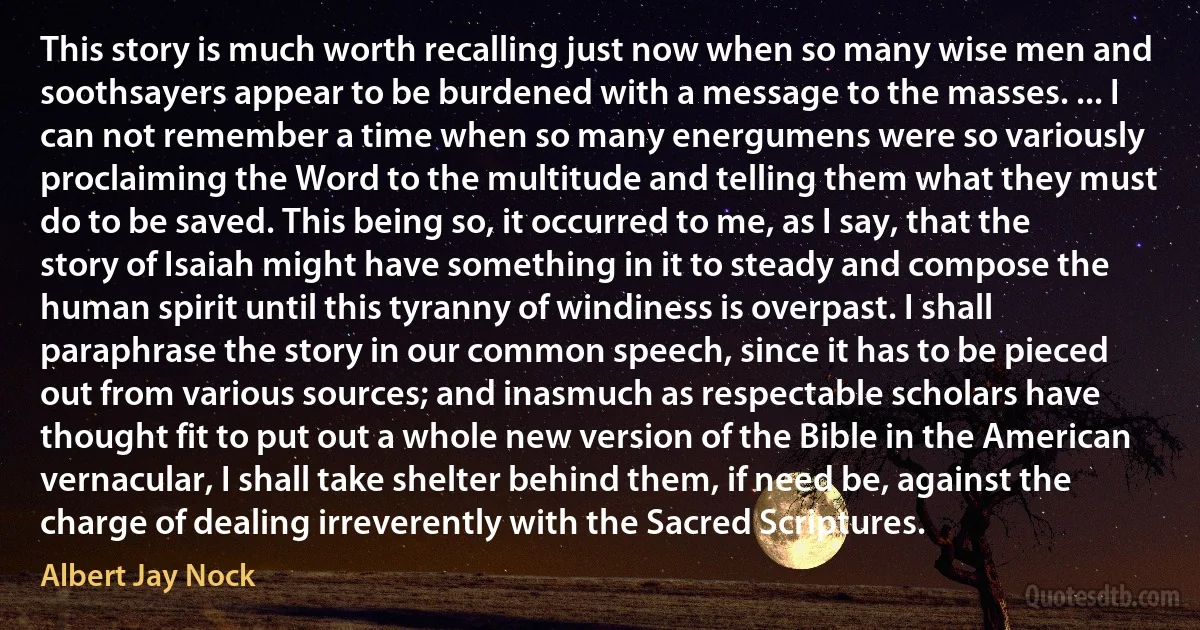Version Quotes - page 30
The Senate general provision also states that savings may result from non-commencement of the P/A/P or the inability of the agency to obligate its released allotment and implement it within the period when the appropriation is valid, whereas the House version qualifies that savings also result from non-commencement of a P/A/P, meaning the inability of the agency to obligate an allotment only within the first semester of the year. In the same manner, the Senate provision demands more fiscal responsibility from agencies by adding the proviso in Sec. 68 that "Programmed appropriations which have not been released or allotments not obligated due to the fault of the agency concerned shall not be considered as savings and shall revert to the General Fund.”.

Francis Escudero
"He's kind of the Democratic version of John McCain," said Sen. Jon Tester (D-Mont.). "I say that partially in jest. But partially it's true: Joe's a hard guy to figure out how to lead. You know? He dances to his own music." Like McCain, the moonshine-swigging former quarterback isn't afraid to let his colleagues know where he stands on a given day, either in the hallways of the Capitol or on cable news airwaves. Manchin often publicly discusses how he's struggling with issues or tough votes.

John McCain
Greg, what are you talking about? Ending corruption? Like there's a version of this society that isn't corrupt? Corruption isn't the exception, it's the norm. It's baked in. The whole idea of using markets to figure out who gets what is predicated on corruption-it's a way to paper over the fact that some people get a lot, most of us get not much, and so we invent a deus ex machina called market forces that hands out money based on merit. How do we know that the market is giving it to deserving people? Well, look at all the money they have! It's just circular reasoning.

Cory Doctorow
These are stories, then, about Man and Nature. We've been telling ourselves such stories forever, as a way of making sense of what we call our "relationship to nature”-to borrow that curious, revealing phrase. (What other species can even be said to have a "relationship” to nature?) For a long time now, the Man in these stories has gazed at Nature across a gulf of awe or mystery or shame. Even when the tenor of these narratives changes, as it has over time, the gulf remains. There's the old heroic story, where Man is at war with Nature; the romantic version, where Man merges spiritually with Nature (usually with some help from the pathetic fallacy); and, more recently, the environmental morality tale, in which Nature pays Man back for his transgressions, usually in the coin of disaster-three different narratives (at least), yet all of them share a premise we know to be false, but can't seem to shake: that we somehow stand outside, or apart from, nature.

Michael Pollan
Luther's Qualifications. Luther had a rare combination of gifts for a Bible translator: familiarity with the original languages, perfect mastery over the vernacular, faith in the revealed word of God, enthusiasm for the gospel, unction of the Holy Spirit. A good translation must be both true and free, faithful and idiomatic, so as to read like an original work. This is the case with Luther's version. Besides, he had already acquired such fame and authority that his version at once commanded universal attention.

Philip Schaff
The German Rendering. The German language was divided into as many dialects as tribes and states, and none served as a bond of literary union. Saxons and Bavarians, Hanoverians and Swabians, could scarcely understand each other. Each author wrote in the dialect of his district, Zwingli in his Schwyzerdütsch. "I have so far read no book or letter," says Luther in the preface to his version of the Pentateuch (1523), in which the German language is properly handled. Nobody seems to care sufficiently for it; and every preacher thinks he has a right to change it at pleasure, and to invent new terms." Scholars preferred to write in Latin, and when they attempted to use the mother tongue, as Reuchlin and Melanchthon did occasionally, they fell far below in ease and beauty of expression.

Philip Schaff
Today the entire academia and media in India are under the stranglehold of this state-sponsored version of India's history which is eulogized as the secular version, and is supposed to promote national integration. Voices of dissent are met not with solid evidence or straight logic but with a swearology coined by subversive politics.

Sita Ram Goel
Thirty-one years ago [1948], Dick Feynman told me about his "sum over histories" version of quantum mechanics. "The electron does anything it likes," he said. "It just goes in any direction at any speed, forward or backward in time, however it likes, and then you add up the amplitudes and it gives you the wave-function." I said to him, "You're crazy." But he wasn't.

Freeman Dyson
More than an athlete, Cruyff was also a great thinker, someone who reinvented the sport (...) Cruyff has left us now, but his vision and philosophy will hopefully live forever. You can see it in the way Barcelona-one of two clubs Cruyff revolutionized, along with Ajax-still plays every week. It's a style that has admirers around the world. I think a lot of people share that [philosophy] with him. You want to see this type of game, where you set the tone, you control the game, you make it fast, you make it attractive and attacking. He's always been famous for his version of the 4–3–3 with the wide wingers, all technically highly gifted and fast. This is his mark."

Johan Cruyff
Unfortunately for all of them, the Archaeological Survey of India (2003) and the Allahabad High Court (2010) reconfirmed the old consensus: of course, a Hindu temple had stood at the site and had been forced to make way for the mosque. So, all these Leftist efforts to impose a rewritten version of history had been in vain. Moreover, in her recent book Rama and Ayodhya, Meenakshi Jain has documented what a sorry figure these supposed "experts” have cut when they were questioned in court during the Ayodhya proceedings. One after another was forced to admit that he didn't really know, that he hadn't been to the site though pontificating on its archaeology, that is was all just a hypothesis. So, those were the people who had been cited as authority by all the politicians, journalists and India-watchers. If the truth of their politically motivated deception is given proper publicity, their game will be over. (Ch. 16)

Koenraad Elst
When Europeans first thought up the AIT around 1820 (after having espoused the OIT for half a century) and then took it to India, many Indians simply denied that anyone had come from anywhere, and pointed out correctly that nothing amounting to what is known as the Aryan invasion (with the importation of Sanskrit from outside) is described in scripture... Both Sanskrit professor Nicholas Kazanas (Athens) and myself have many anecdotes up our sleeves of how any Homeland debate in which the OIT figures, is being stonewalled by AIT-leaning linguists... Then again, this genocide does exist, viz. as part of the Dravidianist mythology, especially in its missionary version, because of overcompensation for the real genocide of natives in the Americas that accompanied their Christianization. (Ch. 30)

Koenraad Elst
I think this article was misleading in saying that I "recognized" Wikipe-tan. My removal of the sexualized version from Commons was in no way an endorsement of the standard versions. I don't like Wikipe-tan and never have. I recognize that some people do, and I'm not particularly agitated about it, but my name should not be invoked in a way that might lead some to believe that I approve. Thanks!--Jimbo Wales (talk) 11:33, 7 February 2011 (UTC)

Jimmy Wales
Women have fantastic intuition. I think they come more naturally to grace; tenderness and affection are considered feminine qualities. It's important for men to learn from women those characteristics that don't come as naturally to us. I think my father was raised in a time when those things were taught to be signs of weakness; that is, if you were sensitive and aware in a different way from just the macho version. It's wonderful that that's changing.

Val Kilmer
In September 2007, a poll of fifty songwriters conducted by the magazine Q listed "Hallelujah" among the all-time "Top 10 Greatest Tracks" with John Legend calling Buckley's version "as near perfect as you can get. The lyrics to 'Hallelujah' are just incredible and the melody's gorgeous and then there's Jeff's interpretation of it. It's one of the most beautiful pieces of recorded music I've ever heard."

Jeff Buckley
Like Barrymore and Laughton and Brando, he seemed to be developing an obsession with false noses, false faces. He had once, at least, played a role in his own face, Harry Lime in The Third Man, a role he had written for himself; [B]y the sixties he was encased in make-up and his own fat, like an huge operatic version of W.C. Fields.

Orson Welles
In 1879, American economist Francis Walker tried to explain why members of his profession were in such "bad odor amongst real people". He blamed it on their inability to understand why human behavior fails to comply with economic theory. We do not always act the way economists think we should, mainly because we're both less selfish and less rational than economists think we are. Economists are being indoctrinated into a cardboard version of human nature, which they hold true to such a degree that their own behavior has begun to resemble it. Psychological tests have shown that economics majors are more egoistic than the average college student. Exposure in class after class to the capitalist self-interest model apparently kills off whatever prosocial tendencies these students have to begin with. They give up trusting others, and conversely others give up trusting them. Hence the bad odor.

Frans de Waal
Another of the religious right's scams is marching into public school science classes and trying to mandate teaching of "creation science," as opposed to evolution. Somehow, they put evolutionism and creationism in the same category-believing that one makes the other impossible. But aren't these two separate systems of knowledge? One is a scientific theory, the other is a religious doctrine. It's kind of like comparing the law of gravity to the Sermon on the Mount. Evolution doesn't pretend to disprove the Bible's version of creation, or the belief in an all-powerful being as "prime mover" of the universe. Science only deals with what's observable, definable, and measurable. It's open to all possibilities, unlike creationism, which is a closed book. So leave evolution to the science teachers, and creation to the Sunday school of the parents' choosing.

Jesse Ventura



